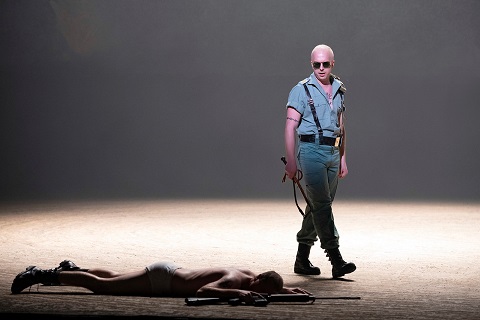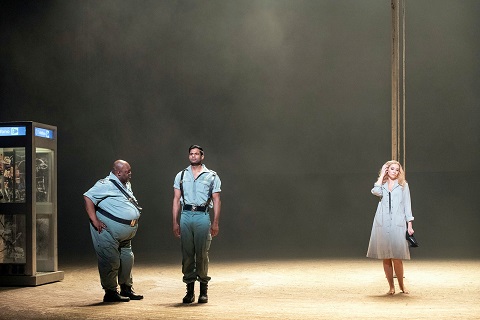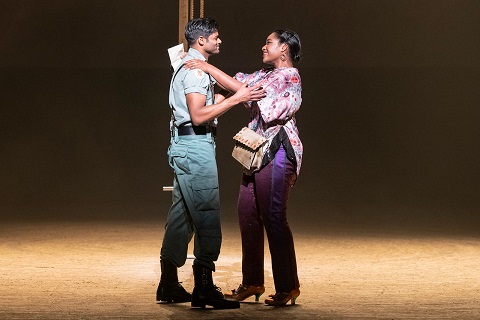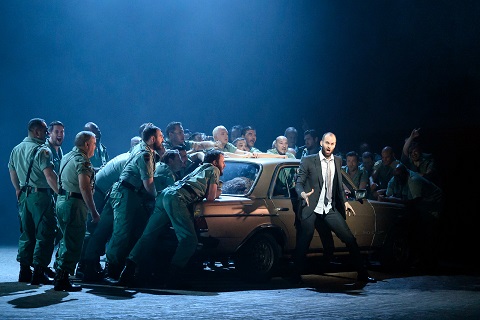
30 Jan 2020
Bieito's Carmen returns to English National Opera
‘Men Behaving Badly’ wouldn’t be a bad subtitle for Calixto Bieito’s production of Carmen, currently being revived at ENO.
English Touring Opera are delighted to announce a season of lyric monodramas to tour nationally from October to December. The season features music for solo singer and piano by Argento, Britten, Tippett and Shostakovich with a bold and inventive approach to making opera during social distancing.
This tenth of ten Live from London concerts was in fact a recorded live performance from California. It was no less enjoyable for that, and it was also uplifting to learn that this wasn’t in fact the ‘last’ LfL event that we will be able to enjoy, courtesy of VOCES8 and their fellow vocal ensembles (more below …).
Ever since Wigmore Hall announced their superb series of autumn concerts, all streamed live and available free of charge, I’d been looking forward to this song recital by Ian Bostridge and Imogen Cooper.
The Sixteen continues its exploration of Henry Purcell’s Welcome Songs for Charles II. As with Robert King’s pioneering Purcell series begun over thirty years ago for Hyperion, Harry Christophers is recording two Welcome Songs per disc.
Although Stile Antico’s programme article for their Live from London recital introduced their selection from the many treasures of the English Renaissance in the context of the theological debates and upheavals of the Tudor and Elizabethan years, their performance was more evocative of private chamber music than of public liturgy.
In February this year, Albanian soprano Ermonela Jaho made a highly lauded debut recital at Wigmore Hall - a concert which both celebrated Opera Rara’s 50th anniversary and honoured the career of the Italian soprano Rosina Storchio (1872-1945), the star of verismo who created the title roles in Leoncavallo’s La bohème and Zazà, Mascagni’s Lodoletta and Puccini’s Madama Butterfly.
Evidently, face masks don’t stifle appreciative “Bravo!”s. And, reducing audience numbers doesn’t lower the volume of such acclamations. For, the audience at Wigmore Hall gave soprano Elizabeth Llewellyn and pianist Simon Lepper a greatly deserved warm reception and hearty response following this lunchtime recital of late-Romantic song.
Collapsology. Or, perhaps we should use the French word ‘Collapsologie’ because this is a transdisciplinary idea pretty much advocated by a series of French theorists - and apparently, mostly French theorists. It in essence focuses on the imminent collapse of modern society and all its layers - a series of escalating crises on a global scale: environmental, economic, geopolitical, governmental; the list is extensive.
For this week’s Live from London vocal recital we moved from the home of VOCES8, St Anne and St Agnes in the City of London, to Kings Place, where The Sixteen - who have been associate artists at the venue for some time - presented a programme of music and words bound together by the theme of ‘reflection’.
'Such is your divine Disposation that both you excellently understand, and royally entertaine the Exercise of Musicke.’
Amongst an avalanche of new Mahler recordings appearing at the moment (Das Lied von der Erde seems to be the most favoured, with three) this 1991 Mahler Second from the 2nd Kassel MahlerFest is one of the more interesting releases.
‘And there was war in heaven: Michael and his angels fought against the dragon; and the dragon fought and his angels, And prevailed not; neither was their place found any more in heaven … that old serpent … Satan, which deceiveth the whole world: he was cast out into the earth, and his angels were cast out with him.’
If there is one myth, it seems believed by some people today, that probably needs shattering it is that post-war recordings or performances of Wagner operas were always of exceptional quality. This 1949 Hamburg Tristan und Isolde is one of those recordings - though quite who is to blame for its many problems takes quite some unearthing.
There was never any doubt that the fifth of the twelve Met Stars Live in Concert broadcasts was going to be a palpably intense and vivid event, as well as a musically stunning and theatrically enervating experience.
‘Love’ was the theme for this Live from London performance by Apollo5. Given the complexity and diversity of that human emotion, and Apollo5’s reputation for versatility and diverse repertoire, ranging from Renaissance choral music to jazz, from contemporary classical works to popular song, it was no surprise that their programme spanned 500 years and several musical styles.
The Academy of St Martin in the Fields have titled their autumn series of eight concerts - which are taking place at 5pm and 7.30pm on two Saturdays each month at their home venue in Trafalgar Square, and being filmed for streaming the following Thursday - ‘re:connect’.
The London Symphony Orchestra opened their Autumn 2020 season with a homage to Oliver Knussen, who died at the age of 66 in July 2018. The programme traced a national musical lineage through the twentieth century, from Britten to Knussen, on to Mark-Anthony Turnage, and entwining the LSO and Rattle too.
With the Live from London digital vocal festival entering the second half of the series, the festival’s host, VOCES8, returned to their home at St Annes and St Agnes in the City of London to present a sequence of ‘Choral Dances’ - vocal music inspired by dance, embracing diverse genres from the Renaissance madrigal to swing jazz.
Just a few unison string wriggles from the opening of Mozart’s overture to Le nozze di Figaro are enough to make any opera-lover perch on the edge of their seat, in excited anticipation of the drama in music to come, so there could be no other curtain-raiser for this Gala Concert at the Royal Opera House, the latest instalment from ‘their House’ to ‘our houses’.
"Before the ending of the day, creator of all things, we pray that, with your accustomed mercy, you may watch over us."

‘Men Behaving Badly’ wouldn’t be a bad subtitle for Calixto Bieito’s production of Carmen, currently being revived at ENO.
Setting the action in a Spanish border town or North African colonial outpost in the immediate post-Franco era, Bieito creates a world populated by lascivious soldiers and vicious criminal lowlife. The black air throbs with machismo and testosterone thumps through the veins of the military and smugglers alike. The women - their blingy rags seedy rather provocative - are meat for sexual slaughter, though they are not averse to hair-pulling, cigarette-burning bitch-fests of their own either. The children are beggars.
It’s certainly nasty. At the start, a soldier dressed only in his underpants and carrying a heavy rifle runs in a circle around his military colleagues, a punishment which embodies the ever-tightening twist of a noose. Eventually he collapses and is dragged off, like a carcass. Zuniga gets slammed in a car door. One small child, perilously vulnerable, hovers amid the violence and her innocence seems ripe for ravaging, but Bieito holds back.
 Keel Watson (Zuniga), Sean Panikkar (José), Justina Gringytė (Carmen). Photo credit: Richard Hubert Smith.
Keel Watson (Zuniga), Sean Panikkar (José), Justina Gringytė (Carmen). Photo credit: Richard Hubert Smith.
Designer Alfons Flores offers no ‘set’ as such, just a flag-pole - the Spanish emblem hoisted in Act 1 is unceremoniously used as a beach towel by a lotion-slapping leggy blonde gleefully awaiting the toreador’s exploits in Act 3 - and a telephone kiosk. Carmen emerges from the latter to sing her Habanera, as if it’s her phone-sex showpiece. A dusty circle suggests bullring or barricade, as you like; there’s no freedom whether you in or out. Lillas Pastia’s bar is a second-hand car lot: these brigands keep on the move, though the battered Mercedes need a helping nudge to get rolling. Those in the ENO audience who thought that they were in for an evening of the eye-watering hues and exotic scents of Spain must have been disappointed.
Reviewing the first appearance of this production at ENO, in 2012, I noted that ‘life here is perilous and desperate, and self-serving ruthlessness offers the only hope of survival’ but that this ‘potentially intriguing and insightful concept’ was weakened because ‘such deadening violence is by nature static rather than dynamic, and the problem with this at times startlingly discerning and imaginative production is that as it progresses it needs a shot of dramatic drive’. The problems seemed different this time round but had the same effect.
The bourgeoisie at the Opéra-Comique in 1875 might have been both horrified and titillated in equal and complementary measure by the issues of race, class and gender which Carmen shoved under their noses, but sadly the exploitation and subjugation of women - violence, prostitution, destructive defiance - seem all too familiar now. This production was first mounted at the 1999 Peralada Festival in northern Catalonia, and then adapted for the Gran Teatre del Liceu in 2010. At twenty years-of-age, it’s starting to feel a bit weary.
Bieito’s images are striking, often unpleasant and sometimes discomforting, but the violence seemed rather abstract on this occasion - dislocated from a real community, real people and genuine relationships. The ENO Chorus sang well, but the vulgar masculinity seemed rather cartoonish. Though Alex Otterburn was a terrific Moralès, really dark and disturbed, Keel Watson’s Zuniga scarcely registered in dramatic terms. Most problematic of all was the fact that there was absolutely no chemistry between the central pair of tragic lovers.
 Sean Panikkar (José), Nardus Williams (Micaëla). Photo credit: Richard Hubert Smith.
Sean Panikkar (José), Nardus Williams (Micaëla). Photo credit: Richard Hubert Smith.
Justina Gringytė, returning confidently to the title role that she performed at ENO in 2015, had plenty of grit and edge, though not much sultriness - at times she sounded as if should be singing Janáček not Bizet, and the Eastern European twang to the English text did not so much suggest ‘an outsider’ as make it impossible to forgo reliance on the surtitles (mercifully the spoken dialogue has been massacred by Bieito to the point of non-existence). There was nothing that was not secure and technically assured about Gringytė’s performance, but it was a ‘motive-less’ as the set was ‘Spanish-less’.
American tenor Sean Panikkar impressed in terms of ardour, colour and warmth, but he did not convey the almost hallucinatory madness that overcomes Don José under the heat of the Spanish sun and in the glare of Carmen’s tempting sexual allure. I wasn’t quite sure why he killed her at the close. Nor, was I convinced that this José had any genuine feelings for Nardus Williams’ Micaëla (or for his own mother, for that matter, whose absence and demise he frequently laments). Williams is asked to forgo any semblance of innocent ingénue and she did this by singing with power, a rich tone enhance by a full vibrato, and grabbing José in a passionate lip-locked embrace. Williams got the biggest applause of the night for ‘Je dis que rien ne m’épouvante’ but how do we square this with the bitchy vulgarity she exhibits when she spits on the spread-eagled Carmen when she manages to get José to leave with her at the end of Act three to visit his dying mother?
 Ashley Riches (Escamillo). Photo credit: Richard Hubert Smith.
Ashley Riches (Escamillo). Photo credit: Richard Hubert Smith.
Ashley Riches struggled to make Escamillo ‘exciting’ - as any ‘torreador’ might, when dressed in a grey suit and deprived of one’s bullring - but he sang with characteristic vigour and precision. If I suggest that Ellie Laugharne (Frasquita) and Samantha Price (Mercédès) were a frightful double act, that’s a positive comment in the context of this production: in fact, the card scene was one of the most persuasive and ‘human’ episodes in the performance.
This is a ‘noisy’ production. The smugglers stamp and stomp, car doors slam, a naked soldier performs the torero’s night-before-the-fight ritual, slapping his abs with quasi-lycanthropic lust under the glow of the moon beam. It can all be rather distracting, especially since conductor Valentina Peleggi didn’t inspire the ENO Orchestra to coloristic heights: it felt rather muted in the pit, though some fine horn and harp playing grabbed one’s attention at times.
Toussaint Meghie’s white-suited, trilby-topped Lillas Pastia got the show underway with a sleight of hand involving a red kerchief à la matador, but it will take more than a box of tricks to make this Carmen come fully alive. Perhaps as the run unfolds the cast will get into the groove and bring some magic - black or otherwise - to Bieito’s twilight zone.
Claire Seymour
Carmen - Justina Gringytė, Don José - Sean Panikkar, Escamillo - Ashley Riches, Micaëla - Nardus Williams, Zuniga - Keel Watson, Moralès - Alex Otterburn, Frasquita - Ellie Laugharne, Mercédès - Samantha Price, Dancairo - Matthew Durkan, Remendado - John Findon; Director - Calixto Bieito, Conductor - Valentina Peleggi, Revival director - Jamie Manton, Set designer - Alfons Flores, Costume designer - Mercè Paloma, Lighting designer - Bruno Poet, Revival lighting designer - Martin Doone.
English National Opera, London Coliseum; Wednesday 29th January 2020.